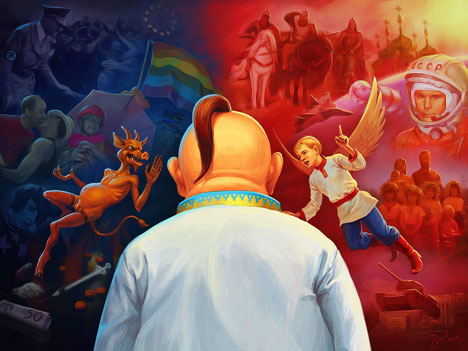[label shape=”” type=””] Ana Gurău [/label]
A dangerous development in public opinion across several post-Soviet countries has been unfolding in the past years, intensifying at the onset of Euromaidan. While viewing virtually any question of public policy through the lens of geopolitics has become perversely normal here, framing gender equality as taking an explicitly “pro-European” or “pro-Western” stance is particularly worrying. Human rights NGOs and activist groups, especially in the countries of the Eastern Partnership, are forcibly drawn into a fight, which is not theirs and which they cannot realistically win under these terms. Instead, local and transparent ownership of human rights activism unravels this destructive binary across communities.
Kyiv, November 2013. As Ukraine approaches the much-expected signature of the Association Agreement with the European Union, posters of all possible sizes across the entire metro system warn the citizens that “in Europe” men pair up with men, and women pair up with women. In other words, Europe is the land of sexual deviancy, and by associating itself with Europe, Ukrainians risk losing their grip on normality. In post-soviet countries, Gayropa[1] remains an aggressive and carefully orchestrated strategy to present gender equality as a foreign policy option, and many commentators and civic activists fall prey to this false dilemma. However, geo–politicizing gender[2] has served and continues to serve exclusively the purposes of reactionaries that idolize either Putinist machismo, or the fundamentalist discourse of the Russian Orthodox Church. As the latter has little to no influence among Muslim communities, the former prevails, and one can always add a little extra “Islamic tradition” to it[3]. Tu put it briefly: geo-politicizing gender only benefits those opposed to the progressive cause.
The foremost danger of attaching gender equality to a certain geopolitical stance is the induced presupposition that a concrete geographic place, emanating the ideal of gender equality, can be found on the map (somewhere in the West). There are two issues with this assertion. First, no such place exists. The struggles for gender equality are far from over even in countries that are assigned the lowest gender inequality indices[4] and are widely regarded as progressive. Reproductive rights, gender-based violence and discrimination, under-representation of women in leadership roles, the gender pay gap, are major themes of these struggles, and ever greater efforts are necessary to make these struggles more intersectional. Therefore, the reactionary portrayal of the West as an equality paradise is factually wrong, and gender equality activists should be very clear on this aspect despite their own geopolitical preferences.
The second issue with assuming that an ideal of gender equality has been realized in Europe or elsewhere in the West is that doing so directly supports the Putinist rhetoric of two competing social models: Gayropa – the debauched culmination of Western history, and Russia – the temple of normality and stability. Unfortunately for progressives, conservatives, and reactionaries alike, this alleged clash is entirely constructed, as both so-called models differ only in the shares of military interventionism, tax evasion, racism, and environmental destruction that they add to their policy mix. A critique of our neoliberal times is necessary across the board, and human rights NGOs have a strong case to build solidarity beyond geopolitics.
The situation of those “pro-West” or “pro-Europe”, who are in fact conservatives, i.e. against any meaningful advancements in gender equality or emancipation of LGBTQI people, is more complex. Full of woefulness about the USSR and Russia, they dream of enjoying the social benefits of an average American or EU citizen, but feel strongly against measures like abortion or same sex marriage[5]. These cherry-pickers of the idea of ‘the West’ are particularly difficult to engage in this debate, and risk being further alienated from the progressive cause if this continues to be presented to them as irremediably attached to their geopolitical option. The solution lies in attempting to build solidarity through aspects that unite people, such as the fight against poverty and corruption, while continuously reinforcing the fact that these fights, as well as that for gender equality, are ongoing everywhere in the world.
Overall, it is imperative to build strong local ownership of human rights programmes, thereby intensifying advocacy efforts that pursue piecemeal and concrete legislative change. This means that there is more work for everyone, donors and implementers alike. While it is certainly true that most funding, if not all, comes to the Eastern Europe and Central Asia region from Western foundations and governments, supporters must be won massively among fellow citizens if change is to take place. Moreover, despite the fact that country ownership has become an important goal of international development in the recent years, few donors have the capacity to truly grasp the local contexts and thus make sure tailored programmes are developed. Human rights NGOs and activist groups must therefore adopt a hands-on approach to how their message is being crafted and delivered.
By understanding the dangers of geo-politicizing the struggles for greater gender equality, human rights NGOs and activists can counter its adverse effects, thereby winning supporters among conservatives. Breaking down the concept ‘gender’ into concrete and solvable policy challenges cuts right across geopolitical divides in societies. Moreover, they can help expose the reactionaries’ alleged call to protect normality, by revealing what it really is: a tactic to divide society, spread hatred, undermine human dignity, and equally important, divert public opinion from issues such as acute poverty and deep-seated corruption.
Note: For an illustration of the terms “progressive”, “reactionary” and “conservative” used in this article, see definitions and discussion in Mark Lilla, Our Reactionary Age, available here: http://www.nytimes.com/2016/11/07/opinion/our–reactionary–age.html (in English).
[1] Oleg Riabov, Tatiana Riabova, The Decline of Gayropa? How Russia Intends to Save the World. Available here: http://www.eurozine.com/articles/2014-02-05-riabova–en.html
[2] Anna Nikoghosyan, In Armenia, Gender is Geopolitical. Available here: https://www.opendemocracy.net/od–russia/anna–nikoghosyan/in–armenia–gender–is–geopolitical
[3] Nicholas Waller, North Caucasus Grand Mufti Endorses Female Circumcision, Available here: http://georgiatoday.ge/news/4477/North–Caucasus–Grand–Mufti–Endorses–Female–Circumcision–
[4] The GII is an inequality index. It measures gender inequalities in three important aspects of human development: reproductive health; empowerment, and economic status. UNDP Human Development Report for 2015 is available here: http://hdr.undp.org/en/content/gender–inequality–index–gii
[5] As human rights activists learned during the presidential campaign in Moldova, when the “pro-European” candidate publicly dissociated herself from the alleged support of the LGBT community, gender equality is not automatically on the agenda of “pro-European” politicians. Evidently, this presupposed support was in fact fabricated by her reactionary, “pro-Russian” opponent. More on the geo-politicization of gender stereotypes in this campaign can be found in На грани пола. Как политики играют на гендерных стереотипах, семейных ценностях и фобиях, Newsmaker.md, available here: http://newsmaker.md/rus/novosti/na–grani–pola–kak–politiki–igrayut–na–gendernyh–stereotipah–semeynyh–tsennostyah–i-28032 (in Russian).
Photo: eurozine.com










The article is flawed from the very beginning. The normalcy of using some geopolitical lens in considering the possible solution of “virtually any public policy” is set as an example by the exactly the more “advanced” democracies in Europe. Don t they call their Union European? Don t they talk all day long about European practices and values?
Geopoliticizing gendere?!… But don t some Western democracies and their ambassadors (and rightly so) champion the cause of LGBTQIIA people and other progressive causes? There is no smoke without fire and no label without (some) substance. It is civilizational and geopolitical. And it is no shame in that. This is a path the West has chosen and despite being called Gayrope, it should not give up the fight for progressivism.
As to the Human Rights, I think that a special thought should be given to how Saudi Arabia, which will double the number of beheadings this year, can hold the chair of the Human Rights Committee of UN.
The arguments are not even worth debating. But I should point to the fact that name calling is not alien to progressivists masked as HR activists. The article labels all the dissenters to the progressive causes as “reactionaries that idolize either Putinist machismo, or the fundamentalist discourse of the Russian Orthodox Church” which is wrong and gives free pass to all the insults coming from the Other side.
Si hai sa recunoastem, cel putin cu feminismul (o ideologie criminala, parerea mea), se sare calul. Maine, poimaine, o sa fie sanctiuni pentru cei care generalizeaza, bineinteles, chestii care nu sunt pe placul ideologilor la moda acum. Iar asta are foarte putin legatura cu discriminarea, in schimb foarte multe in comun cu limitarea dreptului la libera exprimare.
http://www.evz.ro/leon-danaila-reclamat-la-cncd-pentru-afirmatiile-despre-femei.html
Calin, mergi in stafful lui Dodon – acolo ai “libertate de asta de exprimare” (adica posibilitati de a fi nesimtit la inegalitatile pe care le sufera alte grupuri) cat incape..si va fi asa mai bine pentru toata lumea
In primul rand grupurile nu exists. Exista categorii. In al doilea rand vad ca esti pornit pe Dreptul la libera exprimare. Ori nu ai studii juridice, ori nu intelegi ce înseamnă Drepturile Omului. Trei. Ai porniri totalitare. Patru. Ma etichetezi, ma insulti, ma trimiti la Dodon… Faci exact ce spun mai sus. Dar te astepti ca sa nu fac ca tine. Pentru ca te crezi superior moral. Dar nu esti. Faptili, faptili, Vitalica…
Si in general cum ai tu de gand sa faci natiune civica daca jignesti minoritatile etnice? Doar stii ca in primul rând minoritatile l-au votat… Si cred ca esti gagauzofob înainte de toate. Vitalie, Vitalie…
Draga Calin, as aprecia o formulare pe puncte a contra-argumentelor tale. Dupa care discutam. Merci.
🙂 Draga Ana, e mai mult decat clar. E mai clar chiar decat articolul tau. Dintai spun ca anumite practici au un punct de pornire geografic destul de clar. In al doilea rand spun ca etichetarea este o practica fireasca, intalnita si la asa numitii progresisti, chiar tu o utilizezi. In al treilea rand spun ca anumite etichetari sunt pur si simplu insulte, utilizate de toata lumea, dar care din pacate nu conribuie cu nimic la avansarea discutiei. Si dau drept exemplu (in al patrulea rand) Arabia Saudita, care incalca flagrant Drepturile Omului (pe o baza sexista) si nimanui nu ii pasa. Aici, la concluzie, sunt de acord cu teza articolului tau. Totusi explicatia mea este exact contrara argumentului tau. Eu spun ca tocmai geopolitica explica atitudinile mai mult sau mai putin laxe fata de aplicarea Drepturilor Omului de catre anumite tari.
Calin, te rog sa consulti definitia termenului ‘geopolitica’ si de acolo sper sa intelegi ca acesta nu poate fi utilizat ca si explicatie pentru gradul de respectare a drepturilor omului. In plus, asta nu este un contra-argument, pentru ca argumentul meu nu e ‘geopolitica nu explica gradul de respectare a drepturilor omului’, ci ‘geopolitizarea drepturilor omului este periculoasa pentru respectarea acestora’. Fa o lectura mai atenta, mai citeste la subiect, si revenim la discutie. Spor!
Ia fa tu o lectura mai atenta, mai citeste la subiect si sa-mi raspunzi daca subiectul Drepturilor Omului nu e geopolitizat. Sau criza din Filipine si insultarea lui Obama ti se pare ok? Sau de ce Merkel (si toata lumea de fapt) vorbeste de valori EUROPENE? In 1924 au fost adoptate drepturile omului musulman, etc.
De fapt, ce faci tu este sa utilizezi o retorica ieftina gen apa este uda sau nu sta in frig ca o sa racesti. Da, apa este uda si oamenii negociaza absolut orice. Sau te vezi Dumnezeu pentru o zi si ne inveti morala?! Normal ca geopolitizarea este o chestie de-a dreptul rea (nu periculoasa, cum spui tu), dar asta e lumea in care traim, lumea in care tu iti permiti sa ii insulti pe cei care au o alta parere decat a ta, intr-un articol in care te plangi ca “ei” insulta oamenii care gandesc ca tine.
Deci ca sa intelegi si tu: eu spun ca geopolitizarea … este, ca e o lupta de putere pe pietile locale ale valorilor si ideilor, ca universalismul pe care il vrei tu s-ar putea sa nu fie nimic mai mult decat un totalitarism valoric eurocentric in sensul Furtunii lui Shakespeare. Macar de-ai aplica niste teorii de-ale lui Foucault si tot ti-ar fi mai clar…
Spor! Si tare imi pare ca nici tu nu ai inteles ce ai vrut sa spui in articol… si sunt sigur ca nici de Furtuna lui W. S. nu ai auzit.
Calin, daca vei lua de fiecare data indemnul la citit ca pe o ofensa, nu vei iesi prea curand din confuzia conceptuala in care te afli. Eu tin foarte mult la acuratetea conceptelor pe care le folosesc, si in continuare nu inteleg niciunul din contra-argumentele tale. Si nu ma impresioneaza nume de filosofi aruncate la nimereala: ori explici ce teorii foucauldiene se aplica acestui subiect, ori nu-ti pierde timpul cu comentariile. Seara buna.
🙂
1. Indemnul la citit este o ofensa chit ca vine din partea ta. (Stiu, numai voi, progresistii, aveti voie sa insultati si alea nu sunt insulte, ci purul adevar sau ultimul pisc moral. Deci nimeni nu are de ce se supara. )
2. Numai pentru ca tu nu intelegi ce spun, nu inseamna ca sunt intr-o confuzie conceptuala. Parerea mea, de altfel ti-am si spus-o, este ca tu te afli intr-o confuzie conceptuala. Cred ca compari merele cu perele si ideile cu realitatile. Realitatea, in viziunea ta, iese sifonata rau. Classic conceptual bubble. Din care am incercat sa te ajut sa iesi.
3. Cred ca ori ai putin concepte (ceea ce intuiesc), ori nu le combini cum trebuie, ori nu sunt asa de precise cum spui. Te contrazici si asta ti-am aratat.
4. Foucault nu a fost aruncat la nimereala. E vorba de munca lui la genialogiile discursului, dar cred ca dincolo de “teoria patriarhalista” care le explica pe toate, altele nici nu cunosti si nici nu te intereseaza.
5. Stiam ca nu stii de Furtuna lui Shakespeare si nici de bunul salbatic al lui … Pai, ce stii tu despre marsul implacabil al Drepturilor Omului spre sfarsitul istoriei?! 🙂
PS: Dar pana si la final gresesti. Nu e nicio pierdere de vreme. Aflu si eu cata stiinta si cultura e in progresistii din Moldova scoliti prin strainataturi… Sunt dezamagit. Numai aere. Numai imagine si gaunosenie.